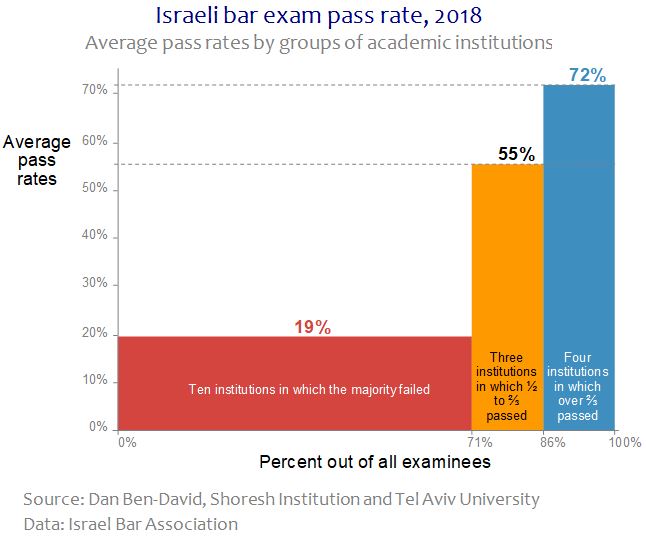The Israeli bar exam as a national parable Dan Ben-David The
share of Israelis with academic degrees is higher than in the populations of
nearly all industrialized countries. But
the country’s labor productivity is among the lowest in the developed world. This would appear to be a fundamental
contradiction – until one understands what happened to us in our race to
prosperity. Israel's
national penchant for short cuts has led to an all-out sprint in pursuit of
degrees rather than knowledge. It
doesn’t matter what one studies, nor does the level of the institution or
academic department matter. The most
important thing is to obtain that coveted piece of paper, the one that opens
the door to wealth and happiness – except that this is not how it works. The
turmoil begins when graduates in Israel begin looking for work. Private firms in a fiercely competitive
global economy don’t have any choice other but to distinguish between graduates
according to their depth of relevant knowledge.
In most disciplines, there are no clear barometers measuring the
tremendous knowledge gaps that exist between graduates from different
institutions. But
one discipline that does test all of its graduates is law – which provides a
national parable for a nation that has lost its way. Each publication of the bar exam results is invariably
followed by a plethora of complaints about the exams’ seemingly intolerable
levels of difficulty, discrimination and more.
There is some validity to these grievances, but the arrows are pointed
in the wrong directions. In
the most recent example, from this past summer, just 32% of the law graduates
taking the bar exam actually passed it.
But as is evident in the accompanying graph, the problem is not with the
exam but rather, the vast majority of those taking it. Some
72% of graduates from four institutions, which accounted for 14% of all
examinees, passed the exam. And there
were three additional institutions where between half and two-thirds of their
graduates passed the exams. The problem
lies in the ten remaining institutions, from which 71% of the examinees
graduated. Over 80% (!) of them failed
the bar exam. 
How
is it possible that there are so many dreadful academic institutions in
Israel? The problem begins a long way
before academia. Israel’s primary and
secondary school system is one of the worst in the West, with about half of its
pupils receiving a Third World education.
Most of them have no chance of accessing high quality – or even
sufficient – academic studies. These
unlucky souls then reach academic institutions, including some very expensive
private ones, that market illusions to fill their classrooms. The
solution, at least at the academic level – if not at the primary and secondary
ones – is transparency. Israel’s Council
for Higher Education must require every department in all of its institutions
to provide each person requesting application forms with data on the wages and
employment of its graduates for each of the three previous years. The country’s Central Bureau of Statistics
can provide such data independently, which that will compel each institution to
improve the quality of its studies so that students will consider applying to
it. |